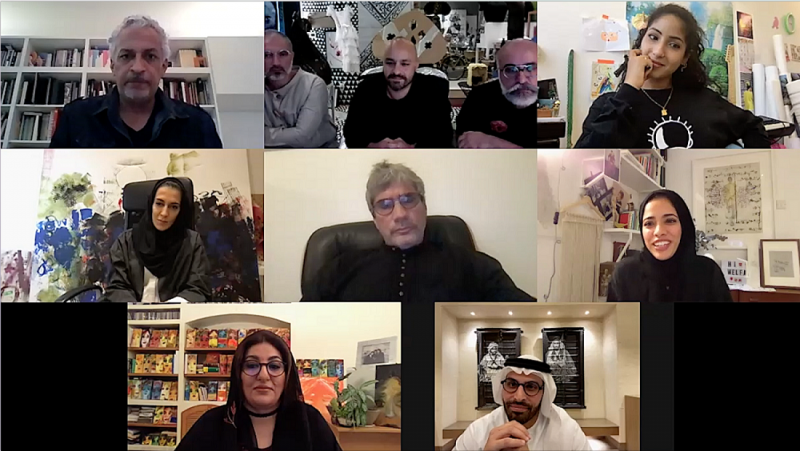Abu Dhabi: The Department of Culture and Tourism – Abu Dhabi (DCT Abu Dhabi) hosted its latest CulturAll Conversations virtual event on Tuesday, 9 June, in which a panel of leading Emirati and UAE-based artists engaged in a thought-provoking debate on the country’s cultural scene.
Titled ‘The Art Community: The Way Forward’ and chaired by HE Mohamed Khalifa Al Mubarak, Chairman of DCT Abu Dhabi, the panel featured a number of inspiring figures who have helped shape the UAE’s art scene, including Afra Al Dhaheri, Nujoom Al Ghanem, Farah Al Qasimi, Shaikha Al Mazrou, Mohammed Kazem, Tarek Al-Ghoussein, Ramin Haerizadeh, Rokni Haerizadeh and Hesam Rahmanian.
HE Al Mubarak began the discussions, which were livestreamed via the Abu Dhabi Culture YouTube channel, by outlining the purpose of the event and the current state of the UAE’s “cultural ecosystem.”
He said DCT Abu Dhabi was aiming to “create an ecosystem and opportunities for artists so that they feel they can aspire to have their artworks displayed throughout society and throughout communities. We feel specifically here in Abu Dhabi that art should be part of our cultural DNA – it should be part of us as, in my opinion, it makes us human. Art is really what creates communication, without a specific language. That’s the beauty of art.”
As well as building large-scale museums, like Louvre Abu Dhabi, Guggenheim Abu Dhabi, and Zayed National Museum, HE Al Mubarak said DCT Abu Dhabi’s cultural strategy involves providing gallery and studio space for artists from all over the world, as well as residencies, scholarships and other means. This was “not just about building the greatest and most beautiful museums,” it was also about creating a grassroots movement. “If it’s not built from the ground up, if it’s not a seed that starts from the ground and then flourishes into a beautiful tree, then we’re not going anywhere,” said HE Al Mubarak. “This is a huge part of our strategy. How do we encompass and how do we harness this huge amount of fantastic talent that we have here.”
Farah Al Qasimi, the Emirati photographer who is now based in New York, agreed that promoting the grassroots of culture from the bottom up was vital for a thriving art scene in the UAE. She said that support for artists tends to come from top down in the UAE, while in other places there is more grassroots effort that comes from artists mobilising around each other.
The Emirati conceptual artist Mohammed Kazem said since the 1970s the UAE government has been supporting artists. The difference is today, he added, that there are many more cultural institutions and opportunities to benefit artists, which is very important for young artists. Kazem joined the military in his youth to financially support himself, but nowadays artists are able to make a living from their work.
Nujoom Al Ghanem, the Emirati filmmaker and poet, said the challenge facing the artistic community was to promote an appreciation of art throughout society. “People still think there is a distance between them and art, they still think art is a foreign thing to them,” she said. “We need to create a national project that will bring everyone together – a project that will bring love to art, will connect our culture with the people, and make art a part of their daily life.”
Another discussion centred on how the COVID-19 pandemic has affected the artistic community. Afra Al Dhaheri, an artist and assistant professor at Zayed University, said the lockdown period has given her more time to spend in her studio. “It’s an important time for artists to stop and reflect,” she said. “We have time to look back and process what our practice has been about. We started to have more time to research, read and reflect, so there’s going to be an abundance of material when this is over.”
Tarek Al-Ghoussein, a visual artist and professor at New York University Abu Dhabi, said the pandemic meant the art world was moving towards more online exhibitions. “But we are missing the in-person dialogue when that happens, as there is a distance when online,” he said.
Another topic of discussion was the teaching of art to youngsters in the UAE. Shaikha Al Mazrou, an artist and lecturer at the University of Sharjah, said her role was to encourage her students to develop a passion for artists. Tarek Al-Ghoussen believed one of his responsibilities as an educator was to manage his students’ expectations. Many students tell him they want to make art to be displayed in the Guggenheim or other museums, but he tries to convince them being an artist is not just about having their art in a museum as instead it’s a vocation and a passion.
Other topics that were debated included the role of institutions in encouraging the development of art, how artists themselves can best utilise the cultural infrastructure in the UAE, and the civic duty that artists have to promote social issues.
In the final section of the conversation, HE Al Mubarak asked each of the participants what would be their one wish for the artistic scene in the UAE. Among their ideas were for abandoned buildings to be turned into art studios; for art to be given equal measure to other subjects in schools; for artists to be given seats on advisory boards of institutions; and for Abu Dhabi to lead a global project to bring humanity together through art.
Further sessions of CulturAll Conversations are planned in the coming months, which will again explore topics related to the Culture and Creative Sector. Dates and further details will be announced soon.
